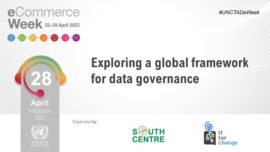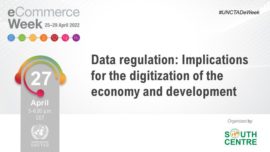Data
Copyright & the Public Interest: Africa and the Global South
International Conference co-organized by South Centre
Dates: 3rd February 2025, 5th February 2025, 6th February 2025
Locations: Johannesburg and Cape Town, South Africa
(more…)
The Global Digital Compact we need for people and the planet
by Anita Gurumurthy, Nandini Chami, Shreeja Sen, Merrin Muhammed Ashraf of IT for Change
The Zero Draft of the Global Digital Compact (GDC) to be adopted at the Summit of the Future is crucial to international digital cooperation under a transformative vision of global digital governance. It should identify the means for achieving equitable participation, sustainable development, gender equality, increased local capacity, public ownership of core digital infrastructure and address the concentration of power in the digital economy. This SouthViews considers some of the shortcomings of the draft GDC, particularly in attaining equitable international data governance and democratic participation in a digital multistakeholder scenario to avoid data monopolies and ensure inclusive policy-making processes, while recentering the objectives of Internet governance for inclusive and development-oriented information societies.
(more…)
The Global Digital Compact: opportunities and challenges for developing countries in a fragmented digital space
By Carlos Correa, Danish, Vitor Ido, Jacquelene Mwangi and Daniel Uribe
The adoption of a Global Digital Compact (GDC) as one of the outcomes of the Summit of the Future opens up the opportunity to address in a systematic manner issues that are of critical importance for the digital global governance. It also poses a challenge to developing countries, as most of them lack the infrastructure and capabilities to fully participate in the digital transformation. Many inequalities, including a deep digital divide, do exist and would need to be addressed by the GDC for it to become a real instrument of change and improvement in the living conditions and the prospects of a better future for most of the world population. This paper examines the current fragmentation in the digital governance and some of the issues raised by the proposals made by the UN Secretary-General for adoption of the GDC.
(more…)
Data Access and the EU Data Strategy: Implications for the Global South
By Marc Stuhldreier
This study explores the value of data in the digital economy and the challenges surrounding data ownership, access rights, and equitable distribution of the value. It examines the European Data Strategy and highlights its shortcomings as well as its implications for the Global South. This contribution emphasises the need for unlocking the potential of collected data by enhancing accessibility and challenging protectionist measures and discusses the importance of fair competition and innovation. It also discusses the importance of balancing access rights with legitimate privacy concerns, trade secrets, and intellectual property rights. The paper concludes by highlighting the importance for developing countries to introduce tailored regulations that suit their specific needs, empowering them to seize opportunities and navigate the digital economy effectively.
(more…)
DATA FOR DEVELOPMENT: HOW TO LEGALLY CHARACTERIZE DATA?
SOUTH CENTRE’S CONTRIBUTION TO THE eTRADE FOR ALL LEADERSHIP DIALOGUE OF THE UNCTAD eCOMMERCE WEEK 2022
Radical technological changes have always challenged pre-existing legal frameworks as demonstrated, for instance, by the commercialization of computer software independently from hardware and the use of genetic information to develop biotechnological innovations in various areas such as health and agriculture. The emergence of big data is a new and outstanding example of such situations. With the growing digitalization of multiple activities, ranging from education and health to ‘smart farming’ and the supply of the most diverse goods, the production and storage of data have exploded. Individuals, businesses and governments are generating an immense amount of data and this will only continue to grow in the future. Yet, the legal characterization of data is still a matter of considerable divergencies and debate. Policy makers and scholars are still searching for legal approaches suitable to address the complex relationships among producers, processors, controllers and users of data…
(more…)
UNCTAD eCommerce Week 2022: Data and Digitalization for Development
Exploring a global framework for data governance
Organized by South Centre and IT for Change
28 April 2022, 5-6.00 PM (CET)

(more…)
UNCTAD eCommerce Week 2022: Data and Digitalization for Development
Data regulation: Implications for the digitization of the economy and development
Organized by South Centre
27 April 2022, 5-6.00 PM (CET)

(more…)














